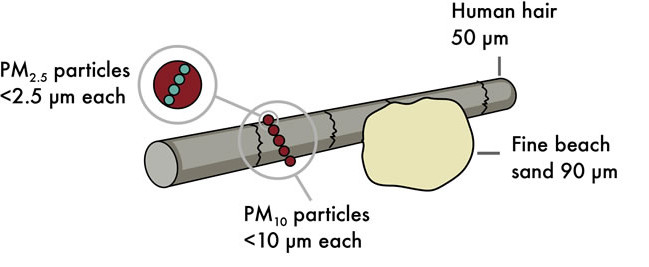Why air quality matters
Why good air quality is important and how poor air quality can affect your health.
Why good air quality is important and how poor air quality can affect your health.
Sources of air pollution are:
Natural PM10 and PM2.5 particles include sea salt, dust, pollens and volcanic ash. PM2.5 is also formed through chemical reactions in the atmosphere.
On average person inhales around 14,000 litres of air every day. When the air we breathe is of poor quality it can affect our health.
Particulate matter (PM) is a collective term for solid and liquid particles suspended in the air and small enough to be inhaled. PM varies greatly in structure and chemical composition depending on where it comes from. PM comes from human activities and natural sources. It is often classified according to its size because size determines how PM interacts with the environment and human body.
These are classified as:
| PM10 | particles with a diameter of 10 micrometres or less |
| PM2.5 | particles with a diameter of 2.5 micrometres or less |
| TSP | total suspended particulate |

Image: Ministry for the Environment
When we breathe in, the hairs in our nose and air passages generally remove particles larger than 10 micrometres in size. Particles smaller than 10 micrometres can penetrate into the lungs and affect our health.
Some of the most common health effects include irritation of eyes, throat and lungs. Breathing in these particles can also make existing respiratory conditions such as asthma or bronchitis worse.
Studies show that breathing in these particles can increase the number of hospital admissions and emergency department visits, school absences, lost work days and restricted activity days.
International and New Zealand studies show a correlation between levels of particles and the number of people who die each year (the mortality rate).
| children |
| adults with obstructive lung disease |
| asthmatics |
| the elderly |
Air pollutants can settle out of the air onto land and water bodies. From the land they can wash into and concentrate in waterways or be taken up by plants and animals.
When air pollutants come into contact with plants they can impair plant growth. If animals inhale them they can be affected in the same way as humans.
Particles in the air reduce visibility because they can scatter or absorb light. Reduced visibility can occur at night or during the day.
Air quality in New Zealand is relatively good by international standards, however there are areas of the country where air quality needs to improve. T
Some cities and towns can have quite bad particle pollution, especially in winter. In 2013, the highest PM10 24 hour average concentration recorded at one location was close to 140µg/m3 in 2013.
| urban areas |
especially during winter smog conditions when particles from home fires get trapped close to the ground by temperature inversions |
| localised areas |
(eg, where there are dusty activities or industrial discharges). |